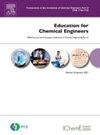Individualised process simulation examination: A novel online take-home approach within a flipped classroom
IF 2.3
2区 教育学
Q1 EDUCATION, SCIENTIFIC DISCIPLINES
引用次数: 0
Abstract
The development and application of the software tool “Take-Home Exercise/Exam” (THEE) in the graduate class “Introduction to Computer Aided Process Engineering” (Intro CAPE) addresses gaps in process simulation pedagogical conveying and presents a novel approach to learning practices. These gaps exist in theoretical frameworks, in assessment strategies, and in methods for individualised student evaluation, particularly under digital and online constraints. The novel THEE tool introduces a secure and fully online assessment framework that enhances student engagement and supports independent learning through flipped classroom methodologies while ensuring academic integrity. Implemented in the Intro CAPE course, THEE facilitates individualised assignments, automated grading, and immediate feedback, establishing a new standard for pedagogical practices in process simulation amidst the growing trends of digitalisation and remote learning. The application of THEE in the Intro CAPE curriculum led to notable improvements in student performance and increased course registration rates relative to declining student enrolment in the department. Regular assessment allowed targeted adjustments of content to support students' long-term development. Student feedback highlights the benefits of a flipped classroom structure, which encouraged deeper engagement with the course material. THEE embedded into the new course structure enables examinations in an introductory course by providing the resources for exercise and exam tasks with different skill levels. Future enhancements will focus on improving instructional videos, and testing more complex process designs to allow for a gradual improvement of student capabilities and self-guided learning. The aim is to develop a long-term, flexible digital framework for exercises and exams, using THEE that integrates and builds on the increasing digitalisation and internationalisation in the process industries and in the education for chemical engineers.
个性化过程模拟考试:翻转课堂中一种新颖的在线带回家方法
在研究生课程“计算机辅助过程工程导论”(Intro CAPE)中开发和应用软件工具“家庭作业/考试”(THEE),解决了过程模拟教学传达中的空白,并提出了一种新的学习实践方法。这些差距存在于理论框架、评估策略和个性化学生评估方法中,特别是在数字和在线限制下。新颖的电子商务工具引入了一个安全的、完全在线的评估框架,通过翻转课堂方法提高学生的参与度,支持独立学习,同时确保学术诚信。在引入CAPE课程中,THEE促进了个性化作业、自动评分和即时反馈,在数字化和远程学习日益增长的趋势下,为过程模拟的教学实践建立了新的标准。电子商务在CAPE入门课程中的应用显著改善了学生的表现,提高了课程注册率,相对于该系学生入学率的下降。定期评估允许有针对性地调整内容,以支持学生的长期发展。学生的反馈强调了翻转课堂结构的好处,它鼓励学生更深入地参与到课程材料中。嵌入到新课程结构中的THEE通过为不同技能水平的练习和考试任务提供资源,使考试能够在入门课程中进行。未来的改进将侧重于改进教学视频,并测试更复杂的过程设计,以逐步提高学生的能力和自主学习。其目标是为练习和考试开发一个长期、灵活的数字框架,使用电子商务,整合并建立在过程工业和化学工程师教育中日益增长的数字化和国际化基础上。
本文章由计算机程序翻译,如有差异,请以英文原文为准。
求助全文
约1分钟内获得全文
求助全文
来源期刊

Education for Chemical Engineers
Multiple-
CiteScore
8.80
自引率
17.90%
发文量
30
审稿时长
31 days
期刊介绍:
Education for Chemical Engineers was launched in 2006 with a remit to publisheducation research papers, resource reviews and teaching and learning notes. ECE is targeted at chemical engineering academics and educators, discussing the ongoingchanges and development in chemical engineering education. This international title publishes papers from around the world, creating a global network of chemical engineering academics. Papers demonstrating how educational research results can be applied to chemical engineering education are particularly welcome, as are the accounts of research work that brings new perspectives to established principles, highlighting unsolved problems or indicating direction for future research relevant to chemical engineering education. Core topic areas: -Assessment- Accreditation- Curriculum development and transformation- Design- Diversity- Distance education-- E-learning Entrepreneurship programs- Industry-academic linkages- Benchmarking- Lifelong learning- Multidisciplinary programs- Outreach from kindergarten to high school programs- Student recruitment and retention and transition programs- New technology- Problem-based learning- Social responsibility and professionalism- Teamwork- Web-based learning
 求助内容:
求助内容: 应助结果提醒方式:
应助结果提醒方式:


